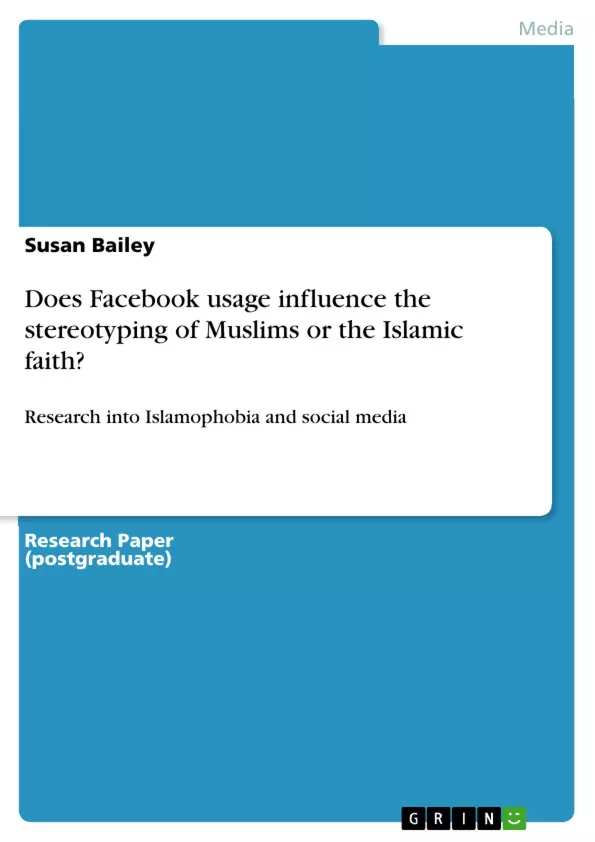This is a quantitative primary study into whether there is a link between social media usage and Islamophobic attitudes. This research was completed by asking university students to complete a likert scale questionnaire designed to attempt to measure their trust, gender oppression, fear and distance of Muslims. This data was then compared to their Facebook usage, to identify any link.
Inhaltsverzeichnis (Table of Contents)
- Abstract
- Introduction
- Literature review
- Islamophobia
- Social Media
- Conclusion of literature review
- Methodology
- Philosophy
- Method
- Design
- Sample
- Ethics
- Results
- Test One
- Test Two
- Test Three
- Test Four
- DISCUSSION
- References
- Acknowledgements
Zielsetzung und Themenschwerpunkte (Objectives and Key Themes)
This dissertation investigates the potential influence of Facebook usage on the stereotyping of Muslims and the Islamic faith. The study aims to examine the role of Facebook within the broader context of Islamophobia, drawing upon existing research and exploring the relationship between social media and hate speech.
- The impact of Facebook usage on stereotyping of Muslims and the Islamic faith.
- The role of Facebook in perpetuating Islamophobia and anti-Muslim hate speech.
- The relationship between social media platforms and the spread of negative stereotypes.
- The prevalence of anti-Muslim hate speech online and its potential consequences.
- The influence of social media on public perceptions and attitudes towards Muslims.
Zusammenfassung der Kapitel (Chapter Summaries)
The dissertation begins with an introduction that contextualizes the study within the broader issue of Islamophobia and explores the role of social media in the spread of negative stereotypes. The literature review critically analyzes existing research on Islamophobia and social media, examining the methodologies and findings of previous studies. This section also highlights gaps in existing research and identifies the need for further investigation. The methodology chapter details the research design, including the philosophical underpinnings, data collection methods, and ethical considerations. It outlines the use of a quantitative primary study employing a Likert scale questionnaire to collect data from a sample of university students. The results section presents the findings of the study, examining the relationship between Facebook usage and stereotyping of Muslims across several variables. The chapter concludes by discussing the significance of the findings and the implications of the research for understanding the role of social media in shaping public perceptions and attitudes towards Muslims.
Schlüsselwörter (Keywords)
This dissertation explores the key themes of Islamophobia, social media, stereotyping, hate speech, and online communication. It examines the potential influence of Facebook usage on public perceptions of Muslims and the role of social media platforms in perpetuating prejudice and discrimination. The study draws upon empirical research findings and existing literature on social media, hate speech, and Islamophobia, with a particular focus on understanding the complex relationship between these concepts.
Frequently Asked Questions
Does Facebook usage increase Islamophobic attitudes?
This quantitative study investigates the potential link between social media usage and stereotypes, measuring variables like trust, gender oppression, and fear of Muslims among university students.
What methodology was used in this dissertation?
The research employed a primary quantitative study using Likert scale questionnaires to collect data from university students regarding their social media habits and perceptions of Islam.
What aspects of Islamophobia are measured in the study?
The questionnaire was designed to attempt to measure levels of trust, perceived gender oppression within the faith, fear, and social distance towards Muslims.
What is the role of Facebook in spreading hate speech?
The dissertation explores Facebook's role in perpetuating anti-Muslim hate speech and how social media platforms can influence public perceptions and attitudes.
Who were the participants in this research?
The study targeted university students to analyze the relationship between their digital lives on Facebook and their real-world attitudes towards the Islamic faith.
- Citation du texte
- BA Hons Criminological studies with social sciences Susan Bailey (Auteur), 2018, Does Facebook usage influence the stereotyping of Muslims or the Islamic faith?, Munich, GRIN Verlag, https://www.grin.com/document/446110



